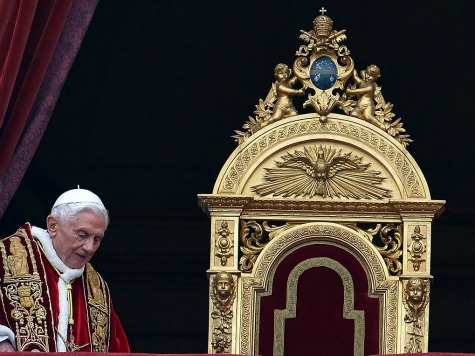
On the eve of the announcement of his resignation, Pope Benedict the XVI tweeted from his @Pontifex Twitter account:
We must trust in the mighty power of God’s mercy. We are all sinners, but His grace transforms us and makes us new.
The pope will transition from his life as the successor to St. Peter to retirement on February 28th, following an eight-year pontificate. He will be the first pope to resign in more than 600 years.
According to Vatican spokesman Father Lombardi, Pope Benedict’s decision to resign was not prompted by medical illness but to a natural “decline in strength” associated with old age.
Though the announcement was a surprise, it was not a snap decision but rather one that “had matured over the past few months,” Lombardi said.
The pope made his announcement in Latin from a pre-written text during a morning ordinary public consistory where a large number of cardinals were present.
Pope Benedict told the cardinals:
In today’s world, subject to so many rapid changes and shaken by questions of deep relevance for the life of faith, in order to govern the bark of St. Peter and proclaim the Gospel, both strength of mind and body are necessary, strength which in the last few months, has deteriorated in me to the extent that I have had to recognize my incapacity to adequately fulfill the ministry entrusted to me.
Father Lombardi observed that, when he delivered his announcement, the pope seemed very “composed, concentrated” and read “in a solemn manner” in keeping with the importance of what he was saying.
Fulfilling church law, Pope Benedict declared to the cardinals:
Well aware of the seriousness of this act, with full freedom I declare that I renounce the ministry of Bishop of Rome, Successor of St. Peter, entrusted to me by the cardinals on 19 April 2005, in such a way, that as from 28 February 2013, at 20:00 hours, the See of Rome, the See of St. Peter, will be vacant and a conclave to elect the new supreme pontiff will have to be convoked by those whose competence it is.
At the end of his announcement, the pope told the cardinals present:
I thank you most sincerely for all the love and work with which you have supported me in my ministry and I ask pardon for all my defects. And now, let us entrust the holy church to the care of our supreme pastor, our Lord Jesus Christ, and implore his holy Mother Mary, so that she may assist the cardinal fathers with her maternal solicitude, in electing a new supreme pontiff.
Cardinal Sodano, who was present for the Pope’s announcement, said that he felt “a sense of loss, almost completely incredulous.”
However, the cardinal said that it was obvious the pope’s decision was based on a “great affection” for the well-being of the Church.
Lombardi observed that being a pope today is “much more fast-moving, more demanding” than it has been in the past. The full schedule, he said, was almost nonstop, with public and private events, as well as liturgical celebrations.
According to the Code of Canon Law, the pope has the option to step down but must make the decision freely and “duly manifested.” The last pope to resign was Pope Gregory XII in 1415.
Pope Benedict will not take part in the Conclave for the election of his successor. He will move to the papal residence in Castel Gandolfo, outside of Rome, when his resignation becomes effective. He will then move to a cloister, currently under renovation, that is located inside the Vatican Gardens.
According to Father Lombardi, it is likely that Pope Benedict will continue to write, since he has mentioned many times that he has wanted to spend more time dedicated to study and prayer.
Lombardi said that there is no anticipation of confusion over leadership in the Church, because the pope clearly demonstrated his desire to step down and renounce his papal authority.
The Vatican spokesman confirmed that the pope’s resignation is “absolutely not” related to any depression.
Lombardi said that the pope has experienced increasing difficulty walking, often using a cane, and always requiring assistance getting up and down stairs.
In his interview, “The Light of the World,” with German journalist Peter Seewald, Pope Benedict said, “If a pope clearly realizes that he is no longer physically, psychologically, and spiritually capable of handling the duties of his office, then he has a right and, under some circumstances, also an obligation to resign.”
The pontiff added, however, that the pope “must not run away” and “must stand fast and endure” any difficult situations that face the Church.
Regarding the pope’s decision to resign, Cardinal Timothy Dolan of New York, president of the U.S. Conference of Catholic Bishops, said:
The Holy Father brought the tender heart of a pastor, the incisive mind of a scholar and the confidence of a soul united with His God in all he did. His resignation is but another sign of his great care for the Church. We are sad that he will be resigning but grateful for his eight years of selfless leadership as successor of St. Peter…
Pope Benedict often cited the significance of eternal truths and he warned of a dictatorship of relativism. Some values, such as human life, stand out above all others, he taught again and again. It is a message for eternity.


COMMENTS
Please let us know if you're having issues with commenting.